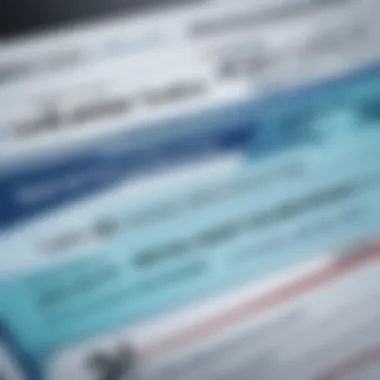How to Effectively Check Your Social Security Number


Intro
The Social Security Number (SSN) serves as a crucial component of personal identification in the United States. Understanding how to check and verify your SSN is vital due to its importance in various aspects of life, from employment to credit applications. A correctly validated SSN not only ensures accurate tracking of your earnings but also helps prevent identity theft. This guide provides methods and resources for verifying your SSN effectively, including essential precautions to safeguard your identity.
The Significance of SSN
The SSN is more than just a number. It is issued by the Social Security Administration and plays a significant role in managing benefits and tracking individuals. Knowing how to maintain control over this number should be a priority. Individuals use their SSN for numerous reasons:
- Employment considerations
- Tax filing
- Obtaining loans or credit
- Establishing eligibility for government services
Misplacing or misusing your SSN can lead to serious problems, including identity theft, making knowledge of its security imperative.
Methods for Verifying Your SSN
Verifying your SSN can be simple yet requires attention to detail. The typical methods for verification include:
- Official SSA Services: The Social Security Administration provides online services where you can verify your SSN. You can access your SSN verification form and other helpful resources.
- Tax Records: Tax documents such as W-2 forms contain your SSN. Comparing these documents aids in verification.
- Financial Institutions: Many banks or credit unions may also have methods to validate your SSN before granting financial services.
Precautions When Accessing Your SSN
It’s crucial to be cautious when checking your SSN, especially due to the increase in online scams and identity theft. Here are some vital tips:
- Use Official Websites: Only visit official resources like those provided by the Social Security Administration to access your information.
- Beware of Phishing: Do not share your SSN or any personal information unless through trusted channels.
- Monitor Your Accounts: Regularly check your financial statements for unauthorized transactions.
Important: Always shred any documents with your SSN before discarding them to minimize the risk of identity theft.
Common Misconceptions
There are many misconceptions about checking your SSN:
- No Need for Verification: Many people believe they will remember their SSN and do not routinely verify it. Regular checks are essential.
- Inaccessibility of SSN Records: Some think it is overly complicated to see their SSN on government sites, when in fact the process can be made straightforward by following correct procedures.
Understanding and checking your SSN is important for ensuring its proper usage. Being proactive about verification can protect against many issues in today's digital age. In following sections, additional resources and in-depth instructions will be discussed to further aid readers.
Understanding the Social Security Number
Understanding the Social Security Number (SSN) is crucial in today’s society. The SSN serves not just as a number, but as a significant component in various personal and financial contexts. From applying for loans to securing job offers, the SSN plays a role in how individuals are recognized and treated within systems that govern personal identification.
To appreciate the impact of the SSN, it is necessary to dissect its foundational aspects and functional purposes. This framework provides essential indications about why an individual requires clarity regarding their SSN.
Definition and Purpose of the SSN
A Social Security Number is primarily a simple sequence of digits. However, its profound implications stretch across multiple layers of life. The SSN was first introduced in 1936 as part of the Social Security Act in the U.S. It was designed to track individuals' earnings for Social Security benefits.
Over time, the use of the SSN has expanded beyond Social Security to become an integral part of various institutions, often serving as a critical identifier. Now, it functions as a unique identifier for taxing, credit, insurance, and other personal services.
Therefore, every American citizen is assigned an SSN at birth, while non-citizens residing in the U.S. might obtain it upon legal admission. Ensuring correct usage and dissemination of this number comes with challenges. Effectively managing a Social Security Number means understanding its vital role in both individual freedom and societal obligations.
Importance of SSN in Personal Identification
The significance of the SSN in personal identification cannot be overstated. It helps in establishing a personal profile in various institutional databases. Banks require it for opening an account, employers for reporting income, and the government for tax purposes.
Moreover, the SSN is often used to verify someone's identity, which plays a critical role in the commencement of financial transactions. This is particularly relevant in today's increasingly digital landscape, where identity verification systems are heavily relied upon for protecting against nude fraud.


It's not only about facilitation but security too. Each time an SSN gets misused, it may have daunting consequences including unauthorized financial transactions or troubles in identifying legitimate accounts. An individual loses privacy as essentially their identity intertwines with the number.
Protecting your Social Security Number implies safeguarding your own identity.
Instilling the habit of checking and understanding one’s SSN is fundamental. Recognizing the pitfalls associated with leakage or misuse remains imperative and contributes greatly to personal security.
When learning about an SSN objectively, consider what comes with it; the opportunities, securities, but also the risks. Managing this knowledge streamlines one's capability to protect oneself in future dealings.
Why You Might Need to Check Your SSN
Understanding the necessity of verifying your Social Security Number (SSN) is essential in today's complex financial and digital landscapes. Many factors influence why individuals have to review their SSN. Accuracy is paramount not just for legal identification, but also for financial transactions. If there's an error, the consequences can inhibit someone from accessing crucial services. Therefore, checking your SSN becomes a matter of personal finance management.
Furthermore, there are legitimate concerns regarding identity theft in modern society. With personal information often available online, your SSN is an attractive target for fraudsters. Ensuring that your SSN appears accurately and therefore safely is imperative to protect your financial wellbeing.
Ensuring Accuracy for Financial Transactions
When it comes financial transactions, precision defines success. Banks and financial institutions heavily rely on your SSN for verification and background checks. Even a small mistake in your SSN can result in various problems, such as thwarted loan applications or issues with tax returns. That can lead not only to delays but to larger financial ramifications like higher interest rates or denied applications.
It is critical to verify your SSN before major implementations, like applying for a mortgage or a car loan. For example, if your name does not match the SSN on record, the institutions may flag your account for potential fraud, impeding any ongoing transactions or services. Verifying information before it matures into a transaction helps to streamline the experiences, enabling citizens to pursue their financing aims confidently.
Monitoring for Identity Theft
The risk of identity theft continues to rise in today's digitized world. Personal identification numbers like SSNs have become keys to a myriad of accounts. They can unlock financial tools, from bank accounts to credit lines. Observing your SSN ensures you remain aware of any potential misuse.
Make it a habit to keep an updated record and check your SSN periodically. Be vigilant for unusual activities, such as unexplained withdrawals or unknown account openings. Victims of identity theft can take months or years to fully recover, all the while dealing with the stress it incurs.
Also, be aware of the techniques used by fraudsters. They often obtain personal information through email phishing, unsecure websites, or even using fake alerts. By routinely checking your SSN, you can stay one step ahead of potential risks and guard against devastating consequences to your finances and reputation.
Understanding how critical your SSN is cannot be overstressed. To monitor and verify it proactively can be a lifelong safeguard for you and your family.
Through precise transactional verification and vigilant monitoring, you take significant steps to defend yourself from financial pitfalls and cyber thieves.
Official Channels for Checking Your SSN
Checking your Social Security Number through official channels is crucial for ensuring accuracy and security. These joits not only provide reliable access to essential information but also help safeguard against identity theft and keep your personal details protected. Utilizing these channels helps instill confidence in the authenticity of the required documentation. You no longer have to rely on informal avenues that may have security compromises.
Social Security Administration Website
The Social Security Administration (SSA) website is the primary and most reliable source for individuals seeking to verify their SSN. It offers a user-friendly interface and guides users through the verification process. To start, navigate to the SSA’s homepage where you will find various services outlined clearly. Here are several key features:
- Secure Access: The website uses encryption to protect your information. When you enter your details, they remain private.
- Verification Process: You can check the status of your Social Security benefits, which indirectly confirms your SSN validity. However, making a direct verification lookup isn’t openly available for privacy reasons.
- Information on Last SSN Issuances: If you suspect inaccuracies or other issues, the site provides information on responses for requests for more information about your assigned number. You simply have to fill out designated forms.
While visiting the SSA website, it's important to ensure you access the official site (https://www.ssa.gov) to avoid phishing attempts.
Requesting a Replacement Card
If you have a need for a replacement card, whether due to loss or damage, the SSA allows you to make this request through both online and offline channels. Here's an overview of the process and key considerations:
- Gather Required Documents: You must provide personal documents that verify your identity such as a driver’s license, U.S. passport, or other state-issued IDs. This documentation supports your request and confirms your identity.
- Application Process: You can fill out Form SS-5, available online or via SSA offices, to request a new card. It is essential to complete all required sections to avoid delays.
- Submission Options: The application can be submitted through mail or in person. The SSA website outlines the specifics of each option, including estimated waiting times for new cards.
Utilizing these official channels enables you to confidently manage issues related to your SSN while protecting your personal information effectively. Remember to keep your personal records secure and well-maintained, to simplify verification whenever necessary.
Alternate Methods for Checking Your SSN
This section highlights various alternate methods for tracking down your Social Security Number (SSN). Understanding these methods is essential for ensuring accuracy in your personal identification. This comprehensive understanding can provide trusted avenues for verification beyond official channels.


Using Personal Documentation
Tax Documents
Tax documents play a crucial role in verifying your Social Security Number. Common forms used, like the W-2 and 1099, contain your SSN as part of your tax information. The key characteristic is that these documents are issued officially by employers or financial institutions, ensuring credibility.
These documents stand out because they are routinely filed with the Internal Revenue Service as part of your annual tax obligations. An advantage of tax documents as a source for confirming your SSN is their legal validity and frequent accessibility. However, unlike other methods, accessing older documents may require some effort to locate past returns, which can also be somewhat tedious.
Social Security Card
The Social Security card itself is one of the most reliable sources for your SSN. It is usually the first version of your SSN issued to you, and its purpose is precisely to inform about your SSN. This document is straightforward to use for verification because it is specifically created for this goal.
The unique feature of the Social Security card is its official endorsement by the Social Security Administration, making it a primary source indeed beneficial for this article. However, its biggest disadvantage may lie in the chances of misplacing it or the slow process involved in obtaining a replacement if lost.
Employment Records
Employment records comprise a valuable resource for confirming your Social Security Number. They typically include your payroll records, contracts of employment, and sometimes even your offer letters, which will usually state your SSN also. A distinguishing feature of these records is their formation by your employer, granting them authenticity that can carry weight when verifying your identity.
The advantage of using employment records include easy access since they are usually kept at your workplace or are vocated by dedicated human resources departments. Although their main downside is that if you change jobs often, maintaining a complete record of all employment history may become confusing.
Contacting Financial Institutions
Reaching out to financial institutions is another prudent method for confirming your SSN. Banks and credit organizations have extensive records and may accommodate inquiries about the discrimination of requests made using your SSN on file. The things need to be succinct; however, you may need to go through verification security measures to access these records efficiently. Financial institutions also entail somewhat complex timings since the queuing to speak with customer service can affect retrieval speed. However, this strategy remains dependable when proper channels are used.
Online Services for SSN Verification
Online services for verifying your Social Security Number (SSN) have become increasingly relevant in today’s digital age. Many individuals now prefer the convenience of online access for numerous administrative and personal tasks. By utilizing online services, people can validate their SSN quickly without waiting for physical paperwork or official visits.
These services often provide effective platforms for individuals and organizations to check the accuracy of a Social Security Number. Private verification services can offer faster response times and simpler procedures compared to traditional methods. However, the ease of online access opens up a multitude of challenges.
Private Verification Services
Private verification services vary widely. Typically, these companies aim to help individuals and institutions confirm the validity of SSN information. The benefits of employing these services include the following:
- Quick Results: Users usually receive their verification within minutes.
- User-Friendly Interface: Many platforms are designed to guide you through the process with no technical skills required.
- Accessibility: These services are often 24/7, providing the chance to verify your SSN at any point.
However, selecting a credible private verification service is crucial. Not all offer the same level of security or reliability. Look for companies that emphasize data protection and have transparent operating practices.
Risks Associated with Online Verification
While online verification services offer convenience, caution is essential. Numerous risks can arise when verifying your SSN online:
- Data Privacy Issues: Sharing your SSN online can expose it to unscrupulous entities if the service is not secure.
- Fraudulent Services: Some sites may look legitimate but aim to collect personal information without providing real verification.
- Scams: Increasing technological capabilities have unfortunately given rise to scams luring individuals into compromising situations.
Ensure you research each platform before providing your Social Security Number. Understanding security measures in place helps safeguard your identity.
Consumers should remain vigilant and adopt best practices for online security. By being informed and cautious, you can realize the benefits of online SSN verification while minimizing the potential risks.
Precautions to Take When Checking Your SSN
Checking your Social Security Number (SSN) can be a critical task with implications for your financial and personal safety. However, this process requires specific precautions to mitigate risks associated with identity theft and fraud. When engaging in verification activities, understanding these precautions is essential. Knowledge about potential dangers enables you to protect yourself and your sensitive data more effectively.
Avoiding Scams and Fraudulent Websites
When undertaking the task of checking your SSN, it’s vital to avoid scams and fraudulent websites. The internet holds a variety of platforms that claim to provide SSN verification services, but many of these can lead to personal data breaches. Scam sites often resemble legitimate sites, making it difficult to distinguish them without proper diligence.


- Verify the Website: Always check the web address. Legitimate sites often have a .gov extension, indicating that they are part of government-page domains.
- Look for Secure Connections: Look for “HTTPS” in the URL, which indicates a secure connection. Furthermore, reviewing web reputation through resources like Wikipedia and Reddit can guide you on site authenticity.
- Seek Customer Reviews: Investigate credible reviews from users who previously engaged with a website for SSN checks. This helps gauge whether it has a trustworthy history.
Engaging with fraudulent websites can cost you not only your sensitive data but also time and emotional energy remedying resultant issues. Always maintain vigilant practices when sharing your SSN or other personal information online.
Best Practices for Data Protection
To safeguard your information when checking your SSN, incorporating best practices into your routine is vital. Here are several effective practices to consider:
- Use Strong Passwords: When entering a website, use unpredictable passwords combining letters, numbers, and symbols. Avoid easily guessed options, such as birthdays or pet names. Enabling multi-factor authentication can add another layer of security.
- Utilize Encrypted Sources: Always opt for platforms that provide encrypted transactions. It keeps your entries secure when accessing online SSN verification resources.
- Monitor Your Accounts: Regularly review bank and financial accounts for unusual activity. Being proactive allows you to catch signs of identity theft early.
- Limit Physical Copies: Avoid keeping multiple printed copies of sensitive documents. Instead, store electronic versions safely and access them with caution.
Implementing these best practices can provide you with a safer experience when checking your SSN. Security must not be a secondary thought; it is an integral part of identiy verification processes.
Remember to always remain proactive about your personal information security. The tighter the shield you build, the more likely you are to protect against unwanted scrutiny and identity theft.
Legal Implications of SSN Misuse
Understanding the legal implications of SSN misuse is crucial. When misused, a Social Security Number can lead to severe consequences not just for the victim but also for the perpetrator. SSNs are primary identifiers in systems that manage finances, credit, and government services.
Knowing the laws that surround privacy and identity protection can aid individuals in navigating incidents of fraud and misuse. Moreover, being informed enables people to maintain control over their personal information. Without this knowledge, victims may struggle to secure their financial identities.
Understanding Privacy Laws
Privacy laws are designed to protect individual information from unwarranted exposure or misuse. These laws govern how organizations handle SSNs, detailed data storage, and sharing policies.
The Gramm-Leach-Bliley Act and The Fair Credit Reporting Act are major regulations related to financial information and identity protection. They set guidelines that institutions must follow in storing and sharing your SSN.
Here are key aspects to consider concerning privacy laws:
- Organizations must restrict SSN access to those who need it for necessary functions.
- Disclosure without consent can lead to fines and lawsuits.
- With the growth of technological advancements, breaches due to data theft have increased. Sensitive information demands robust encryption and storage methods within organizations.
Understanding these laws assists individuals in responding effectively if their SSN is misused.
Reporting SSN Theft
When SSN theft occurs, immediate action is paramount. Reporting is the first line of defense against potential or ongoing damage. Victims should report unused benefits as soon as fraud is suspected.
Follow this streamlined process when reporting:
- Contact the Federal Trade Commission (FTC): Fill out the Identity Theft Report to provide evidence of the fraud.
- Notify financial institutions: Inform your banks or credit card companies and request freezes or account changes.
- Get a new SSN: While difficult, in clear cases of theft, it's possible to apply for a new SSN through the Social Security Administration.
- Monitor credit reports: This can catch future fraudulent activity early. Checking your credit report has to be a part of post-theft measures.
Engaging with law enforcement increases the urgency of the situation and potentially aids in arresting the culprits.
Always take preventative measures: Consider using an identity theft protection service to gain redundancy in protecting even your identity today.
By fully comprehending these legislative frameworks and remaining mindful of responses to privacy infringements, individuals can better protect themselves against the consequences of SSN misuse.
The End
In this article, we have explored the necessity of checking your Social Security Number (SSN) and the various methods to do so effectively. Understanding your SSN, as it is pivotal in both personal identification and financial transactions, cannot be overstated. The approaches for verifying your SSN include utilizing official channels, alternative resources, and the internet. Each method holds its own significance and requires awareness of potential risks.
The knowledge about privacy laws and legal implications associated with SSN misuse further underlines the importance of this topic. Awareness is critical to preventing identity theft and potentially disastrous financial repercussions. Overall, protecting your SSN is about minimizing risks and securing your personal data from unauthorized access.
Summary of Key Takeaways
- Checking your Social Security Number is essential for ensuring accurate personal and financial identification.
- Various methods exist, including verifying via official websites or using personal documentation.
- Online services, while convenient, come with their cuen risks related to security.
- Understanding legal implications and protecting against identity theft is crucial in maintaining data safety.
- Always exercise caution and follow best practices while dealing with personal information.
Encouragement to Protect Personal Information
It is imperative to be proactive about safeguarding personal information like your SSN. This number is more than a sequence of digits; it is a vital part of your identity. Avoid sharing your SSN casually, and be cautious regarding whom you provide this information to.
Establish and encourage robust data protection measures. Regularly monitor your financial statements and consult relevant resources if you suspect any un endorsed use of your SSN. Protecting personal information is not a one-time action but an ongoing commitment. This vigilance nurtures a safety environment which is needed to thrive in today’s world, where data breaches are uneasily common.



